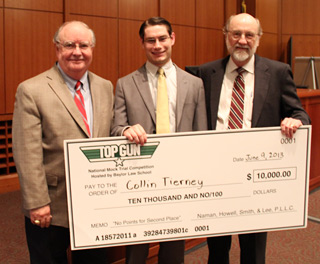
the Waco office of Naman, Howell, Smith & Lee
(left) and Professor Gerald Powell, director of
Baylor Law School’s Practice Court program.
By Andrew Cohen
For Collin Tierney ’14, one of the biggest challenges at Baylor Law School’s Top Gun National Mock Trial Competition was masking his excitement. “I had known about Top Gun for years, and it was my dream just to be invited,” he said. “To actually win was above and beyond.”
But on June 9, when the judges ruled that Tierney had bested 15 of the nation’s top law-student advocates at the invitation-only event, reality—which included a $10,000 prize—trumped fantasy.
The tournament invites each of the 16 top trial advocacy schools, including Berkeley Law, to pick a single advocate to represent it in the competition. Tierney’s triumph marked yet another major step for the law school’s surging advocacy program. Berkeley Law advanced to the final round of this year’s National Trial Competition, and Grace Yang ’12 was named best oral advocate at last year’s National Moot Court Competition.
Tierney heaped praise upon the program’s volunteer coaches, led by Spencer Pahlke ’07 of Walkup, Melodia, Kelly & Schoenberger. Pahlke oversees at least three tournament teams each year and coached Tierney at the Top Gun event.
“Spencer is definitely the glue keeping everything together,” Tierney said. “Beyond the unbelievable amount of time he puts into the program, he also networks like crazy to find seasoned attorneys and alums to help out. Every one of our teams has at least two to three coaches, and Spencer is a big reason why.”
Founded in 2010, the Top Gun competition creates a challenging atmosphere for competitors. Unlike other mock trial competitions, participants do not receive the case file until they arrive—just 24 hours before the first round of trials begin.
Preparation includes reviewing depositions, records and photographs, and visiting the actual places where events in the hypothetical case occurred. Shortly before each round, competitors are assigned witnesses who may be used at participants’ discretion during the round. Distinguished trial lawyers and judges serve as the jurors.
This year’s competitors argued a case concerning a war veteran who was accidentally shot and permanently disabled—by a fellow veteran—during a fight outside a bar. The court was asked to decide whether the shooting stemmed from the bar negligently serving alcohol to the veteran who committed the shooting, or whether post-traumatic stress syndrome was the incident’s underlying cause.
“In this competition, the case has the authenticity that many mock trial fact patterns don’t,” said Tierney, who is working for the Contra Costa County Public Defender’s Office this summer. “Others often have gaps in the record, or you can’t call certain witnesses that in real life you’d be almost compelled to call. It can seem a bit fake or theatrical when you can rehearse for two months and practice over and over.”
No such issue at Top Gun, where the fact pattern was several hundred pages long, and participants had just 24 hours to review it. Organizers added more to the fact pattern after each night of competition.
“The rationale is that this is how a lot of real trials are,” Tierney said. “A senior partner will walk into an associate’s office and say, ‘Sorry, a bigger matter came up last minute, and I need you to take this on.’ All of a sudden you have a weekend to prepare for a trial.”
Tierney, whose father is a public defender, began competing in mock trials in ninth grade. His high school won the Minnesota state championship and went to nationals, where he met Kayla Delgado ’14—named best speaker at the national event—and is now Tierney’s classmate and co-leader of the law school’s student Board of Advocates.
“Our mock trial program has definitely taken off over the past few years,” he said. “It’s exciting to do well individually, but it’s really gratifying to build this kind of legacy at Berkeley Law and to be viewed among the best programs in the nation.”